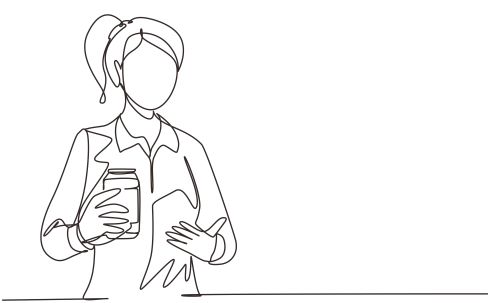Are we doing enough to support neurodiverse people into STEM careers?

Professor Sara Rankin calls on biologists with specific learning difficulties and neurodiverse traits to be open about their challenges – in the hope of inspiring and encouraging other neurodivergent people into the biosciences
20th February 2023
I remember my first argument with my teacher in primary school. It was about the spelling of ‘saw’: not the ‘I saw three ships’ ‘saw’, but the ‘saw’ my dad used for cutting wood. How could two words – one an action word, another a noun, have the same spelling? It made no sense to me.
Spelling was a challenge from then on and I was labelled a ‘slow reader’. (My art teacher thought I was exceptionally gifted and apparently kept my paintings in her loft thinking I could be the next Picasso – sorry to disappoint.) I was also clumsy and so I was sent to dance lessons, where I failed at the bar, but managed to pull through exams with my creative dance.
I think this sums up my career in academia: struggling with mundane yet important tasks such as filling out forms and grant applications, writing and submitting manuscripts, and turning up to meetings on time – even when they are online.
However, while I may not be a great manager, I am an enthusiastic and creative leader. I have led on innovative research, education, public engagement, and equality, diversity and inclusion (EDI) projects. Throughout my career I have enjoyed working collaboratively with artists, physicists, clinicians, material scientists, engineers, societal engagement practitioners, science teachers and special educational needs coordinators, and I am drawn to high-risk interdisciplinary projects.
A late diagnosis
In my late forties I received a diagnosis of dyspraxia and dyslexia, which explained my challenges at school and, more importantly, at home and at work. It is not widely known that people who are dyslexic/dyspraxic have poor executive function skills, which include organisation and time management. Luckily for me I had a supportive husband who kept me organised at home. But, lacking such support at work, I felt in survival mode for most of my academic career.
Following my diagnosis I did a deep dive into the research and literature on neurodivergence (also known as neurodiversity) and specific learning disabilities, and was fortunate to attend a course run by the EDI department at Imperial College London.
I realised that my poor literacy skills were merely the first indicator that my brain fundamentally processes information in a different way to 85% of the population. I am a non-linear, complex thinker, I naturally link disparate ideas, I am a good problem solver, and I am strategic and visionary. Suddenly I could see my ‘disability’ in a new light and realised that I had relied on these strengths to survive in academia. I became a ‘Dyslexia Champion’.
Recognising potential
The UK’s intelligence and cyber security agency, GCHQ, has had a long-standing interest in people who think outside the box and are good problem solvers, as exemplified by Alan Turing. Indeed, it is estimated that 25% of its staff are dyslexic. In a 2022 paper[1] dyslexia and dyspraxia expert Dr Helen Taylor argues that the success of our society is dependent on the interplay between the explorers (neurodivergent) and the exploiters (non-neurodivergent).
Indeed, many businesses (such as Ernst and Young, Microsoft, Google, AstraZeneca, IBM and GSK) have now started to recognise the potential of neurodiverse employees[2], developing new recruitment drives for neurodiverse people and researching what is important to not only recruit and retain them, but support them to thrive, innovating in businesses where AI is predicted to take over the jobs of the linear thinkers. Are we doing enough to support and encourage neurodivergent people into bioscience careers?
A report commissioned by the Royal Society revealed that while 15% of the population are neurodivergent (that is, have a specific learning difficulty or autism), only 5% of UK students studying STEM are, and that the number falls off further at postgraduate level and beyond, with only 0.9% of STEM academics in the UK disclosing as neurodivergent[3]. Such low numbers may, in part, reflect the stigma associated with labels such as dyslexia and autism, leading to academics not disclosing, or it could indicate real barriers to a STEM career in academia.

Women vs Men
Recent research highlights that autism and ADHD manifests very differently in girls and women. Much of the original research was done on white boys and, as such, there are stereotypes, such as autistic people avoiding eye contact, that are not as relevant to half the population. Newer research has led to a wave of older women getting a diagnosis of autism or ADHD. For example, I do not have the traditional ADHD as seen in boys, but I have discovered that I exhibit many of the traits reported for ADHD in women.
I am concerned that the education system is systematically weeding out our future innovators, whether that be by placing boys with ADHD into pupil referral units or creating learning environments and assessments that are not accessible for neurodivergent pupils.
No doubt some of these people will find circuitous routes back into STEM, but this is not an ideal situation. Not only can it be viewed as discriminatory against children who have a protected characteristic, as defined by the Equality Act, but also we need these innovators to step into the shoes of Einstein, Hawking, Turing, Jobs, Gates, Dyson et al, and address the global challenges we are facing in bioscience.
The RSB is supporting the event ‘Celebrating Neurodiversity in STEM’ which takes place on the 22nd March at Imperial College London and online.
Sara Rankin FRSB is professor of leukocyte and stem cell biology at Imperial College London’s Faculty of Medicine and National Heart & Lung Institute
References
1) Helen, T. & Vestergaard, M.D. Developmental dyslexia: disorder or specialisation in exploration? Front. Psychol. 13 (2022).
2) Great Minds Don’t Think Alike: Scottish Widows cognitive diversity report. Scottish Widows (2020); The Value of Dyslexia: dyslexic capability and organisations of the future. Ernst and
Young (2018).
3) Disability in STEM. The Royal Society (2021). www.royalsociety.org/topics-policy/diversity-in-science/disability-reports.


